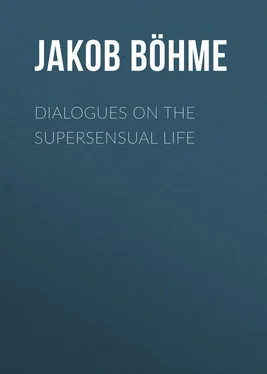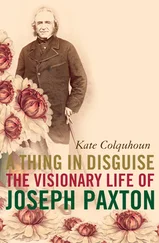Jakob Böhme - Dialogues on the Supersensual Life
Здесь есть возможность читать онлайн «Jakob Böhme - Dialogues on the Supersensual Life» — ознакомительный отрывок электронной книги совершенно бесплатно, а после прочтения отрывка купить полную версию. В некоторых случаях можно слушать аудио, скачать через торрент в формате fb2 и присутствует краткое содержание. ISBN: , Жанр: foreign_antique, foreign_prose, на английском языке. Описание произведения, (предисловие) а так же отзывы посетителей доступны на портале библиотеки ЛибКат.
- Название:Dialogues on the Supersensual Life
- Автор:
- Жанр:
- Год:неизвестен
- ISBN:http://www.gutenberg.org/ebooks/33742
- Рейтинг книги:4 / 5. Голосов: 1
-
Избранное:Добавить в избранное
- Отзывы:
-
Ваша оценка:
- 80
- 1
- 2
- 3
- 4
- 5
Dialogues on the Supersensual Life: краткое содержание, описание и аннотация
Предлагаем к чтению аннотацию, описание, краткое содержание или предисловие (зависит от того, что написал сам автор книги «Dialogues on the Supersensual Life»). Если вы не нашли необходимую информацию о книге — напишите в комментариях, мы постараемся отыскать её.
Dialogues on the Supersensual Life — читать онлайн ознакомительный отрывок
Ниже представлен текст книги, разбитый по страницам. Система сохранения места последней прочитанной страницы, позволяет с удобством читать онлайн бесплатно книгу «Dialogues on the Supersensual Life», без необходимости каждый раз заново искать на чём Вы остановились. Поставьте закладку, и сможете в любой момент перейти на страницу, на которой закончили чтение.
Интервал:
Закладка:
Dialogues on the Supersensual Life
PREFACE
The Works of Jacob Behmen, the "Teutonic Theosopher," translated into English, were first printed in England in the seventeenth century, between 1644 and 1662. In the following century a complete edition in four large volumes was produced by some of the disciples of William Law. This edition, completed in the year 1781, was compiled in part from the older English edition, and in part from later fragmentary translations by Law and others. It is not easily accessible to the general reader, and, moreover, the greater part of Behmen's Works could not be recommended save to those who had the time and power to plunge into that deep sea in search of the many noble pearls which it contains.
Behmen's language and way of thought are remote and strange, and in reading his thought one has often to pass it through a process of intellectual translation. This is chiefly true of his earlier work, the "Aurora" or "Morning Redness." But among those works which he wrote during the last five years of his life there are some written in a thought-language less difficult to be understood, yet containing the essential teaching of this humble Master of Divine Science. From these I have selected some which may, in a small volume, be useful. It seemed that for this purpose it would be best to take the "Dialogues of the Supersensual Life," including as one of them the beautiful, really separate, Dialogue, called in the Complete Works, "The way from darkness to true illumination." In the case of neither of these works is the translation used that of the seventeenth century. The first three dialogues are a translation made by William Law, one of the greatest masters of the English language, and found in MS. after his death. This translation from the original German is not exactly literal, but rather a liberal version, or paraphrase, the thought of Behmen being expanded and elucidated, though in nowise departed from. The dialogue called "The way from darkness to true illumination" was taken by the eighteenth century editors from a book containing translations of certain smaller treatises of Behmen then lately printed at Bristol and made, as they say, "in a style better adapted to the taste and more accommodated to the apprehension of modern readers." I do not know who was the translator, but the work seems to be excellently well done.
It will be well to say a few words first as to the life, then as to the leading ideas of Jacob Behmen. This name is more correctly written Jacob Bœhme, but I prefer to retain the more easily pronounced spelling of Behmen, adopted by the Editors of both the complete English editions.
Jacob Behmen's outward life was simplicity itself. He was born in the year 1575 at Alt Seidenberg, a village among pastoral hills, near Görlitz in Lusatia, a son of poor peasants. As a boy he watched the herds in the fields, and was then apprenticed to a shoemaker, being not enough robust for rural work. One day, when the master and his wife were out, and he was alone in the house, a stranger entered the shop and asked for a pair of shoes. Jacob had no authority to conclude a bargain and asked a high price for the shoes in the hope that the stranger would not buy. But the man paid the price, and when he had gone out into the street, called out "Jacob, come forth." Jacob obeyed the call, and now the stranger looked at him with a kindly, earnest, deep, soul-piercing gaze, and said, "Jacob, thou art as yet but little, but the time will come when thou shalt be great, and become another man, and the world shall marvel at thee. Therefore be pious, fear God, and reverence his Word; especially read diligently the Holy Scriptures, where thou hast comfort and instruction; for thou must endure much misery and poverty, and suffer persecution. But be courageous and persevere, for God loves, and is gracious unto thee." So saying, the stranger clasped his hand, and disappeared.
After this Jacob became even more pensive and serious, and would admonish the other journeymen on the work-bench when they spoke lightly of sacred things. His master disliked this and dismissed him, saying that he would have no "house-prophet" to bring trouble into his house. Thus Jacob was forced to go forth into the world as a travelling journeyman, and, as he wandered about in that time of fierce religious discord, the world appeared to him to be a "Babel." He was himself afflicted by troubles and doubts, but clave to prayer and to Scripture, and especially to the words in Luke xi.; "How much more shall your heavenly Father give the Holy Spirit to them that ask him." And once, when he was again engaged for a time by a master, he was lifted into a state of blessed peace, a Sabbath of the Soul, that lasted for seven days, during which he was, as it were, inwardly surrounded by a Divine Light. "The triumph that was then in my soul I can neither tell nor describe. I can only liken it to a resurrection from the dead."
Jacob returned in 1594 to Görlitz, became a master shoemaker in 1599, married a tradesman's daughter, and had four children. In the year 1600 "sitting one day in his room, his eye fell upon a burnished pewter dish which reflected the sunshine with such marvellous splendour that he fell into a deep inward ecstasy and it seemed to him as if he could now look into the principles and deepest foundations of things. He believed that it was only a fancy, and in order to banish it from his mind he went out upon the green. But here he remarked that he gazed into the very heart of things; the very herbs and grass, and that Nature harmonised with what he had inwardly seen. He said nothing about this to any one, but praised and thanked God in silence. He continued in the honest practice of his craft, was attentive to his domestic affairs, and was on terms of goodwill with all men." 1 1 From the Danish Bishop Martensen's book "Jacob Boehme"; an excellent study well translated from Danish into English by Mr T. Rhys Evans, (Hodder and Stoughton, London, 1885). An account of Behmen's life is given in the preface to the first volume of the last century English edition of the Works.
At the age of thirty-five, in the year 1610, Jacob Behmen suddenly perceived that all which he had seen in a fragmentary way was forming itself into a coherent whole, and felt a "fire-like" impulse, a yearning to write it down, as a "Memorial," not for publication, but lest he should forget it himself. He wrote it early in the morning before work, and late in the evening after work. This was his "Morning Redness" or "Aurora."
A nobleman of the country, called Carl von Endern, happened to see the MS. at the shoemaker's house, was struck by it, and had some copies made. One of these fell into the hands of the Lutheran Clergyman of Görlitz, Pastor Primarius Gregorius Richter, who thenceforth became a bitter opponent of Behmen. He assailed him in sermons, in language of savage invective, as a heretic of the most dangerous kind, until Jacob was summoned before the Magistrates, and forbidden to write anything in future. He was told that as a shoemaker he must confine himself to his own trade. But the affair, as is usually the case, had an effect the reverse of that intended by persecutors. It made him known to various persons more learned than himself who were interested in the subject, and from his converse with them he learned a better style, and some Latin technical terms, which he afterwards found useful for expressing his thoughts.
Jacob obeyed for some years the magisterial command to write nothing, but it was very grievous to him, and he often reflected with dismay on the parable of the talents and how "that one talent which 'tis death to hide" was lodged with him useless. At length he would keep silence no more. He says himself: "I had resolved to do nothing in future, but to be quiet before God in obedience, and to let the devil, with all his host, sweep over me. But it was with me as when a seed is hidden in the earth. It grows up in storm and rough weather against all reason. For in winter time all is dead, and reason says: 'It is all over with it.' But the precious seed within me sprouted and grew green, oblivious of all storms, and, amid disgrace and ridicule, it has blossomed forth into a lily."
Читать дальшеИнтервал:
Закладка:
Похожие книги на «Dialogues on the Supersensual Life»
Представляем Вашему вниманию похожие книги на «Dialogues on the Supersensual Life» списком для выбора. Мы отобрали схожую по названию и смыслу литературу в надежде предоставить читателям больше вариантов отыскать новые, интересные, ещё непрочитанные произведения.
Обсуждение, отзывы о книге «Dialogues on the Supersensual Life» и просто собственные мнения читателей. Оставьте ваши комментарии, напишите, что Вы думаете о произведении, его смысле или главных героях. Укажите что конкретно понравилось, а что нет, и почему Вы так считаете.












